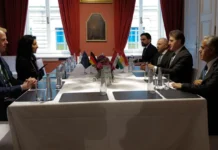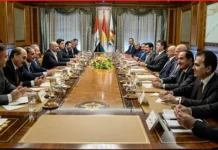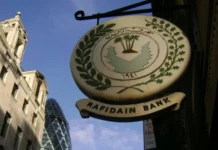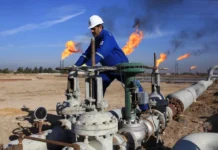BRICS Readies Economic War Endgame
David Lin: 9-5-2025
The world is unequivocally in flux. From shifting geopolitical alliances to volatile energy markets and a challenged financial system, the ground beneath our feet is moving.
We’re not just witnessing isolated events; we’re in a new phase of a broader, fundamental struggle that is reshaping global power dynamics and economic influence.
At its core, this unfolding drama pits the established Western, dollar-centric financial order against an emerging bloc of the Global South, spearheaded by the formidable trio of Russia, China, and India within the BRICS (Brazil, Russia, India, China, South Africa) and Shanghai Cooperation Organization (SCO) frameworks.
The ongoing conflict in UKraine has served as a powerful catalyst, accelerating these changes. While Western nations imposed unprecedented sanctions on Russia, the intended economic collapse has largely been resisted.
Instead, Russia has demonstrated remarkable resilience, successfully reorienting its economic ties and energy exports. India, a rising economic and military power, appears poised to follow a similar path, showing a willingness to absorb U.S. tariffs rather than compromise its sovereignty or strategic partnerships.
This signals a clear bifurcation of global power and economic influence, moving away from a unipolar world.
The conflict in UKraine, while tragic, is widely seen as a pivotal moment in this global realignment. Forecasts suggest a military conclusion within the next 6 to 9 months, with a Russian victory considered likely given its military and economic advantages over UKraine and a NATO bloc struggling with internal cohesion.
Concurrently, Western political leaders in Europe are facing declining popularity and increasing political instability. This undermines their collective position on the global stage, further amplifying the strain on institutions like the European Union.
The EU itself is showing signs of deep stress. Crucial sectors, like Germany’s famed automobile industry, face an uncertain future.
The loss of cheap Russian energy, coupled with new tariffs and fierce competition from China’s rapidly advancing EV sector, poses an existential threat. Brussels’ stringent climate policies, while noble in intent, may inadvertently hasten this decline, potentially provoking significant political backlash or even threatening the very cohesion of the union.
The political turmoil in Norway over energy policy and EU ties further exemplifies Europe’s energy crisis, with potential disruptions to electricity supply if Norway were to cut ties with the EU.
Globally, energy markets remain volatile, yet are currently well supplied. Interestingly, global oil prices don’t fully reflect the major geopolitical risks simmering in the Middle East and elsewhere.
The U.S. policy of sanctioning Russian oil is proving counterproductive, as it effectively raises global prices and, in turn, benefits Russia financially. Meanwhile, new oil production sources from countries like Brazil, Venezuela, and Guyana are set to further reshape supply dynamics, adding new layers of complexity to market stability.
On the financial front, the bedrock of Western economic power – the Federal Reserve’s independence – is being challenged.
Moves to replace Fed officials to align with political agendas signal a potential end to the traditional Fed autonomy. Market expectations for imminent interest rate cuts could increase liquidity, potentially boosting asset prices like gold and Bitcoin – particularly in a scenario where a successful BRICS alternative to the dollar-centric system gains traction.
The discussion paints a compelling picture of a world undergoing a fundamental realignment. Western dominance, long an unchallenged axiom, is now increasingly questioned by a multipolar order shaped by powerful economic blocs in Asia and the Global South.
This monumental shift carries profound implications for global markets, energy supply, geopolitical stability, and the very future of international governance.
This is more than just a passing phase; it’s a structural transformation that demands our attention and understanding.
Courtesy of Dinar Guru: https://www.dinarguru.com/
Frank26 Question: “Did Sudani make an oath to the people of Iraq to RI their currency?” Yes, it was about a year ago in July I believe… That’s when he first made it. It’s called a fatwa…a kind of holy promise…holy oath…They took it seriously. He said, ‘I’ll give you your purchasing power by the end of the year.’ …Then about two months ago Sudani did it again.
Nader From The Mid East Article: “The Central Bank of Iraq has announced the launch of inter wallet money transfer services...” To me they’re talking about international. That’s really good.
Mnt Goat Article: “ECONOMIST: IRAQ ENJOYS FINANCIAL STABILITY THANKS TO THE CENTRAL BANK’S RESERVES.” Quote: “Economic advisor, Mazhar Mohammed Saleh, confirmed on Wednesday that financial stability in Iraq is solid…” Said needed STABILITY and SECURITY to conduct the Project to Delete the Zeros and so they are telling us they have it now.
************
The Gold Trap Just Snapped Shut—And 90% of the World Escaped the Dollar | Andy Schectman
Two Dollars Investing: 9-5-2025
The world is no longer playing by Washington’s rules. A massive shift just took place—one that Western media refuses to acknowledge.
Gold has now become the settlement of choice across BRICS, Asia, and the Middle East, while Treasuries are being quietly abandoned.
Andy Schectman reveals how the “Gold Trap” was deliberately set, how it just snapped shut, and why 90% of the world is sprinting out of the dollar before it’s too late.
If you own gold or silver, this changes everything.
https://www.youtube-nocookie.com/embed/Gq57F77CkkE?feature=oembed&enablejsapi=1






